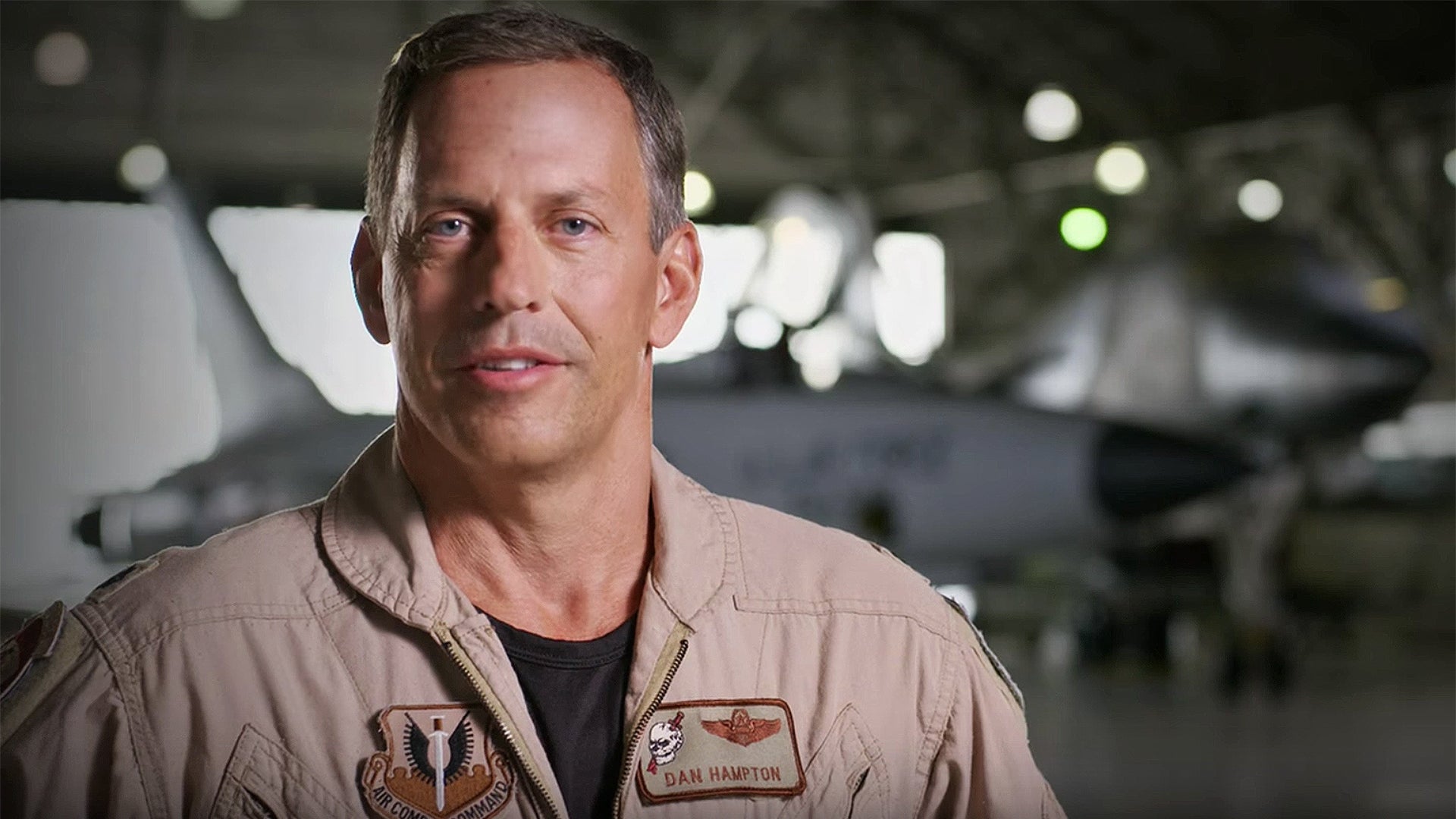Often referred to as the deadliest F-16 pilot, outspoken best selling author Dan Hampton is back to discuss a wide range of issues. Last time we talked, our conversation ranged from women in the cockpit to employing his beloved F-16 to kill the enemy. This time around we cover everything from the USAF’s plan to keep a portion of its F-16s flying until 2048, to the service’s pilot retention woes, to America’s strategy in Iraq. As usual, “Two Dogs” has strong views, and is unafraid to share them.
Hampton wrote one of the best air combat memoirs of all time, Viper Pilot, and has had continued success as an author with Lords of Sky and The Hunter Killers. He also writes a a well-reviewed fiction series based on the mercenary pilot mysteriously known as the Sandman. With his upcoming book about Charles Lindbergh’s historic voyage—aptly titled The Flight—set for release next month, Hampton spent nearly an hour talking The War Zone. It was a lively discussion, to say the least.
Bold italics are the author’s questions, Dan Hampton’s responses are seen in normal text:
The United States Air Force is looking to replace the F-15C/D fleet with existing F-16s upgraded with an active electronically scanned array (AESA) radar. The plan has been viewed as highly controversial. What are your thoughts on using modernized F-16s to fill the role that is currently filled by the F-15C/D Eagle fleet?
Well, we could spend 45 minutes talking about the Air Force and its collective lack of leadership, but it kind of goes to that. Here on the one hand they’re pushing the F-35, and possibly an upgraded F-22, and yet they don’t want to get rid of older 1970s vintage F-15s, right? That’s because for a long time the Air Force was run by what’s called the Eagle Mafia, which were the guys that always wanted to be the white scarf in the wind, air-to-air dog fighting kings. Unfortunately that pretty much went out with Vietnam. You could even argue that it went out with Korea. But they never really grasped that fact, so they never really thought too much of aircraft that did air-to-ground missions or swing-role airplanes like the F-16 that were quite capable of doing their single air-to-air mission, and close air support, and all the other stuff that multi-role fighters do.

I think the situation is illustrating a lot of the issues with the Air Force, and I think the F-16 is more than capable. Northrup Grumman has an APG-80 AESA radar (used on the Block 60 F-16E/F) and their new SABR (APG-83 Scaleable Agile Beam Radar) for the F-16. The only thing the Eagle can do that the F-16 can’t do is it can carry more weapons. But then again if the weapons are so much more accurate and dependable now, then what’s the point?
I mean, I watched an Eagle shoot off six AIM-7s in the first Gulf War and five of them just dropped off the wings and fell to the ground. So carrying more weapons isn’t necessarily a good thing if the weapons don’t work. Now an AIM-7 is not an AIM-120 obviously, but the principle is the same. With an F-16 you get a very active, very versatile fighter in conjunction with some sort of AESA radar. Then you can get away with carrying six missiles and you don’t need ten, right?
These upgraded F-16s would include about 300 Block 40 and 50 jets already in service, and the AESA upgrade would likely go along with the structural and avionics upgrades. So it kind of gives us new life in the F-16. The USAF says they would fly the type till 2048 under the plan—but potentially at the expense of the F-15C/D fleet.
You’re along the right track, and airplanes and equipment are so expensive these days. Almost prohibitively so. But you can’t afford to keep a bunch of aging F-15s around for sentimental purposes and that’s essentially what they’re doing. They’re not needed. When was the last time there was a big dogfight?
We had some air-to-air action in the first Gulf War but I wouldn’t really call it dog fighting when they’re shooting them down with BVR missiles from 15 miles away. I would say the money is better spent on multirole aircraft that can swing from mission-to-mission as required.
What are your thoughts on the USAF’s initiative to possibly field light air support aircraft like the A-29 Super Tucano or AT-6 Coyote? And what do you think about the close air support fly-off that is still planned between the F-35 and the A-10?
I think it’s yet another glaring example of those in charge who just don’t really get it. And here’s what I mean. An F-35 costs upwards of, what, over $100 million each? Yeah, it can do close air support and it’s a multirole fighter and that’s fine, but you’re never going to have enough of them to do the sort of dirty-hand grunt work, close air support stuff that at least I saw in the wars that I was a part of. There’s nothing wrong with the A-10 that can’t be solved by some upgrading and modernization, for crying out loud. I mean we’ve still got B-52s flying. B-52s took their first flight, what, over a decade before I was born.
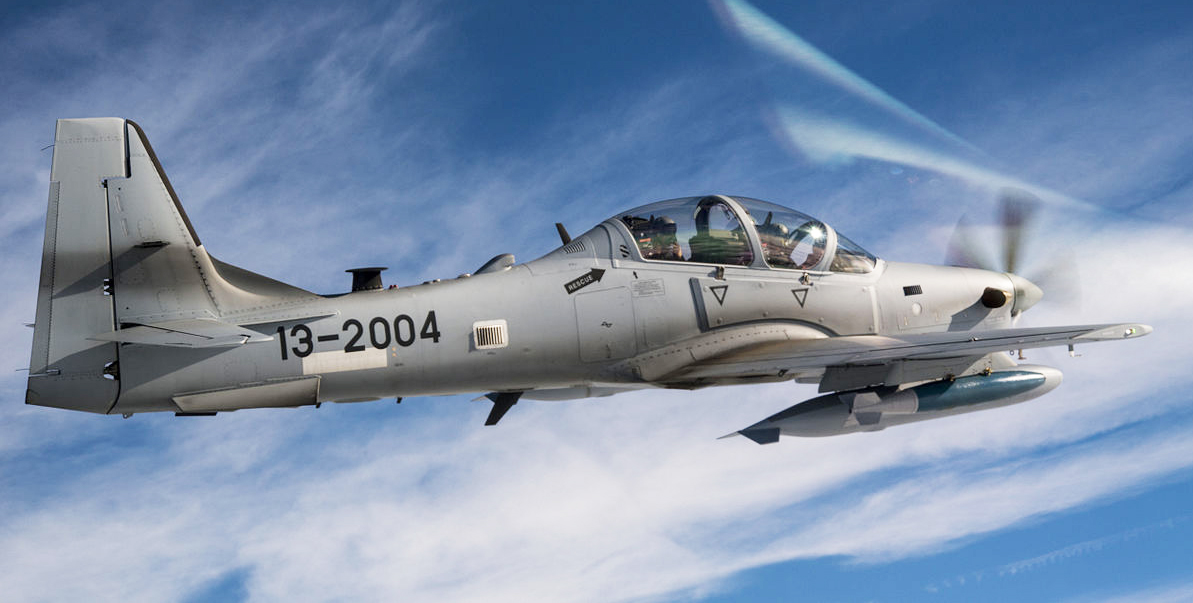
I would say this. Again money isn’t endless the way that it used to be. I would scrap the notion of an improved Raptor, whatever that means, because we definitely do not need single mission aircraft. And what were the numbers for the F-35, like 1,700 was what the Air Force contract called for?
Yeah, 1,763 is the number the Air Force still has as a target.
Yeah, at a $100 million each, that’s going to happen. So what you need is a mix. You need to keep the A-10s around as long as you can. I would have bought the Block 60 F-16E/F version for the U.S. Air Force. I flew that thing. It’s superb. Everything that we complained about for years has been fixed and it’s got the new and better version in it. But the Air Force didn’t buy it because they were in love with the Raptor and the F-35. Maybe somebody is going to look at this again and say, “well, you know what, maybe we were a bit hasty and we need some of each.”
As far as the light aircraft thing, this is classic Let’s fight the last conflict mentality. And this is what makes the drone thing kind of dangerous, too. We haven’t had a real enemy to fight since 2003. I mean, an enemy that had MIGs and SAMs and Triple A. So we’ve gotten used to making do with drones plinking targets with little bombs—Hellfire missiles or whatever—and now the idea that, hey, what we really need is some sort of light attack turboprop.
Well, okay, that will work against certain enemies, but the enemies that we’re going to have to fight later, I hope not sooner, they’re going to have MIGs, they’re going to have SAMs, they’re going to have anti-aircraft systems and IADS (Integrated Air Defense Systems). Those kinds of planes just aren’t going to live through it.
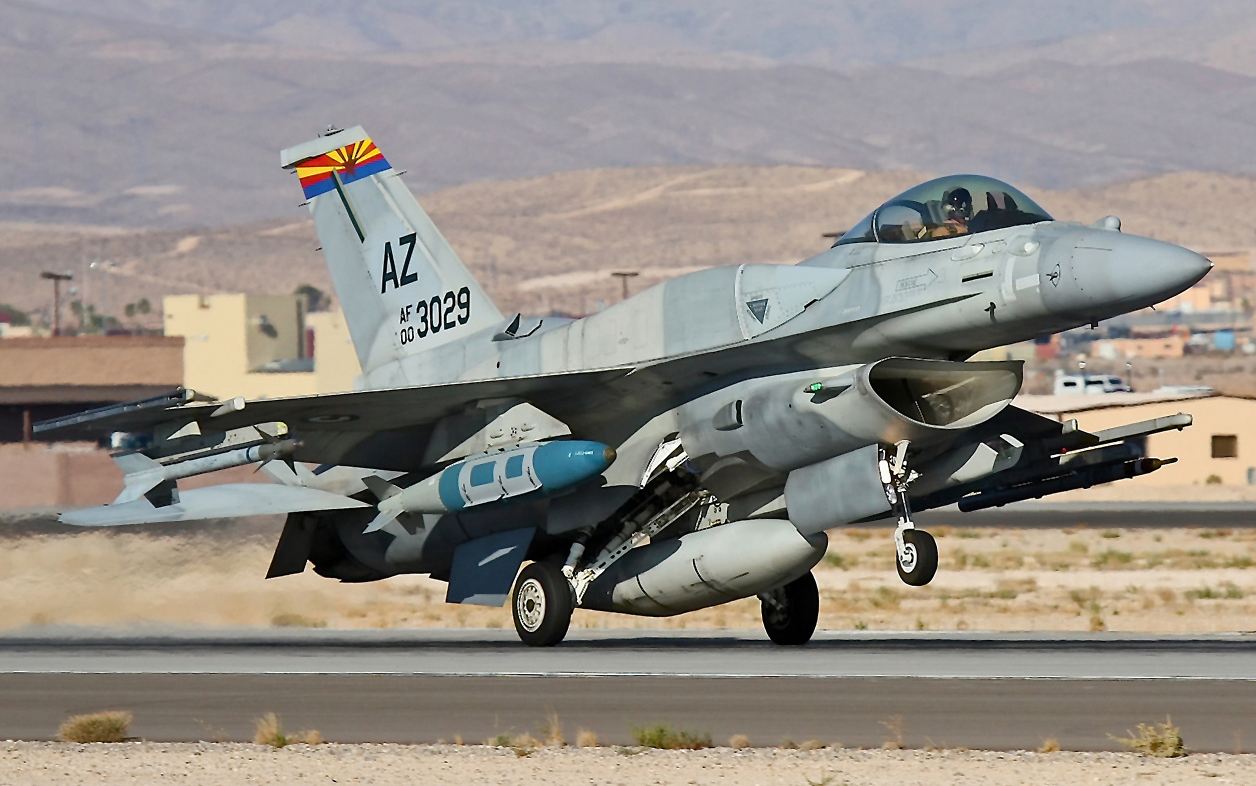
So I would say for the light attack stuff, you subcontract it. There’s plenty of mercenary companies out there, including mine, that do that sort of thing and we do it a lot cheaper and a lot easier and in fact better than the big military does. In fact, the Air Force is on its heels so badly at the moment that they’re going to end up contracting probably all of the adversary air requirements to private military companies, right?
I would say stick with jets and high tech and research and development for the big threat and have enough aircraft of all kinds that you can use them if you need to. But keep in mind the private option for threats that don’t require such a big hammer, rather than swing the force all one way and then be left holding the bag open when you get hit in the face by Russia or China somewhere down the road. Does that make sense?
Then you let the Russians and the Chinese bankrupt themselves trying to keep up with us technically which they’ve never been able to do. That’s what killed the Soviet Union to a large degree. They’ll never be able to do it and then that side of the force is ready to fight that war when and if it happens or at least act as a very sizable deterrent and you haven’t sacrificed anything in the meantime.
Again, I don’t know where this current group of general officers and their ilk come from, but they didn’t come from the same place that I did.
Do you see a high-end, penetrating, unmanned combat air vehicle—even if it’s just to go after fixed targets—as part of that concept?
Yeah, and under certain circumstances I’m all for it. The strength of manned aircraft is in the tactical environment, okay. You’ve got a human who can think faster than a computer and react accordingly with all the right training and everything else that we use to have. We don’t have it so much anymore. The tactical environment is where manned aircraft really are king. You can use the unmanned stuff for the other things. To a large degree some of the strategic level attacks that we’d have to do, certainly stimulating IADS, that sort of thing. I mean all that stuff could be done, fixed targeting, hitting things that don’t move like buildings, bridges, etc. And again, leave the tactical stuff to the humans.
The United States Air Force cannot retain pilots. It’s facing basically a crippling shortage of qualified air crews in the near term and the medium term. What can the United States Air Force do to make staying in its pilot cadre more attractive?
Oh, boy. Yeah, you’re right. It’s to the danger level and people don’t realize that. I think most people don’t realize that you just can’t go get somebody off the street and toss them into an airplane. I mean, this takes years to learn how to do and these are people that have something that most others don’t have to begin with. I don’t know what that something is, I just know that it’s the ability to pull nine Gs and think while you’re doing it, and a perfect willingness, even an eagerness, to put yourself in harms way to go kill the bad guy.
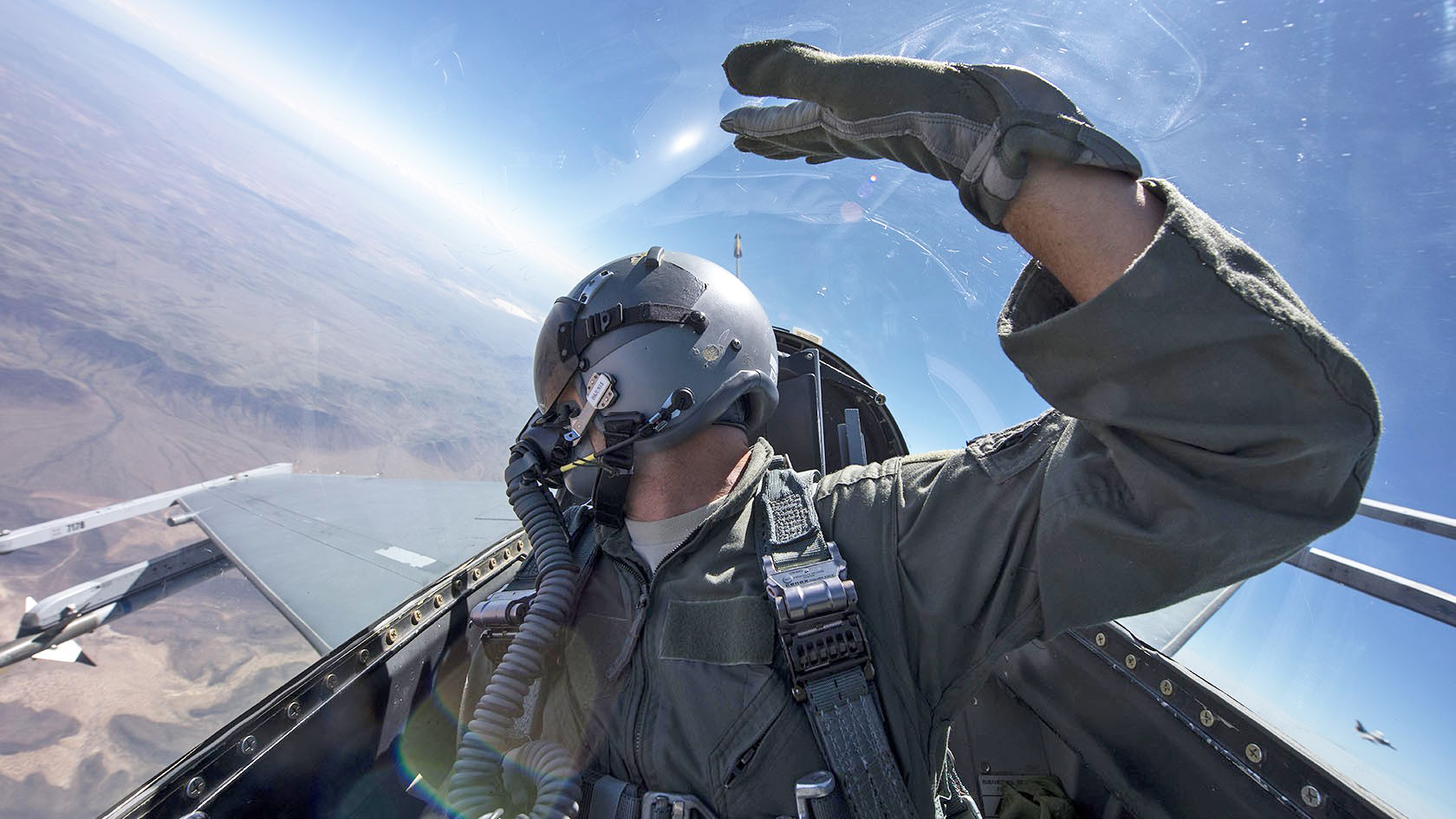
Unfortunately the Air Force’s mentality in recent years has been “well, everybody’s equal, everybody’s the same.” A lawyer or a logistician is just as important. And before people scream about that, let me say that I know very well I could never fight a war without a logistician. A lawyer, yeah, that’s debatable. You’ve got to have the support folks. You’ve got to have everything that puts this in motion. I’m not denigrating that at all. But in the end, they are not the ones who go out and get shot out, whose wives become widows, whose kids become orphans. It’s the pilots that do that.
You’re not going to attract the kind of person that can do that in the current environment that the Air Force has made for itself. It’s just ludicrous. They’ve got something called a Green Dot Training Program now where everybody sits around I think and they listen to statements and decide what would be potentially offensive to somebody. I mean it’s just ludicrous.
The Air Force’s Chief of Personnel, Gina Grosso—what a ridiculous individual. Her solution to the pilot training, or the pilot retention problem, was to somehow magically ask the airlines to stop recruiting pilots.
You hear that and your mouth falls open. Where does this clown come from and who put her in charge of this? It’s not about the money, it’s not about even deploying or anything like that. It’s the way that they have been basically hounded out and treated since this ultra left-wing wave of political correctness swung through the Air Force. I’m not saying there wasn’t some room for housecleaning, because there was, okay, but it’s gone way too far to the other side.
And I think most of the guys I know are out now and the ones that are getting ready to get out, they all decry the Air Force leadership and the way that this is being dealt with. The way that people are getting promoted and kept in and basically trying to kill off the fighter pilot once and for all. In the name of what? I don’t know, the drone, the lawyer, the psychologist? All I know is if we have to fight somebody there’s not going to be anybody left to do the fighting. And they should remember that I think.
Does the Air Force even have enough aircraft now to fight a major conflict? It seems like there’s an idea out there that we can do the same amount of work with half the fleet that we had 10 years ago. Any comment on that?
Well, that’s a complex question which you probably intended and I would say again it goes down to who you wish to fight, who you intend to fight. God knows, the people that have actually fought, like me, don’t want to fight. I mean, if there’s a way to avoid it, then we avoid it. But you have to be ready to do it if you have to. So the worst enemy on our stage has been the Soviet Union, or Russia now. China to a lesser degree. I don’t think China is really going to attack us they own too much of our national debt for that.
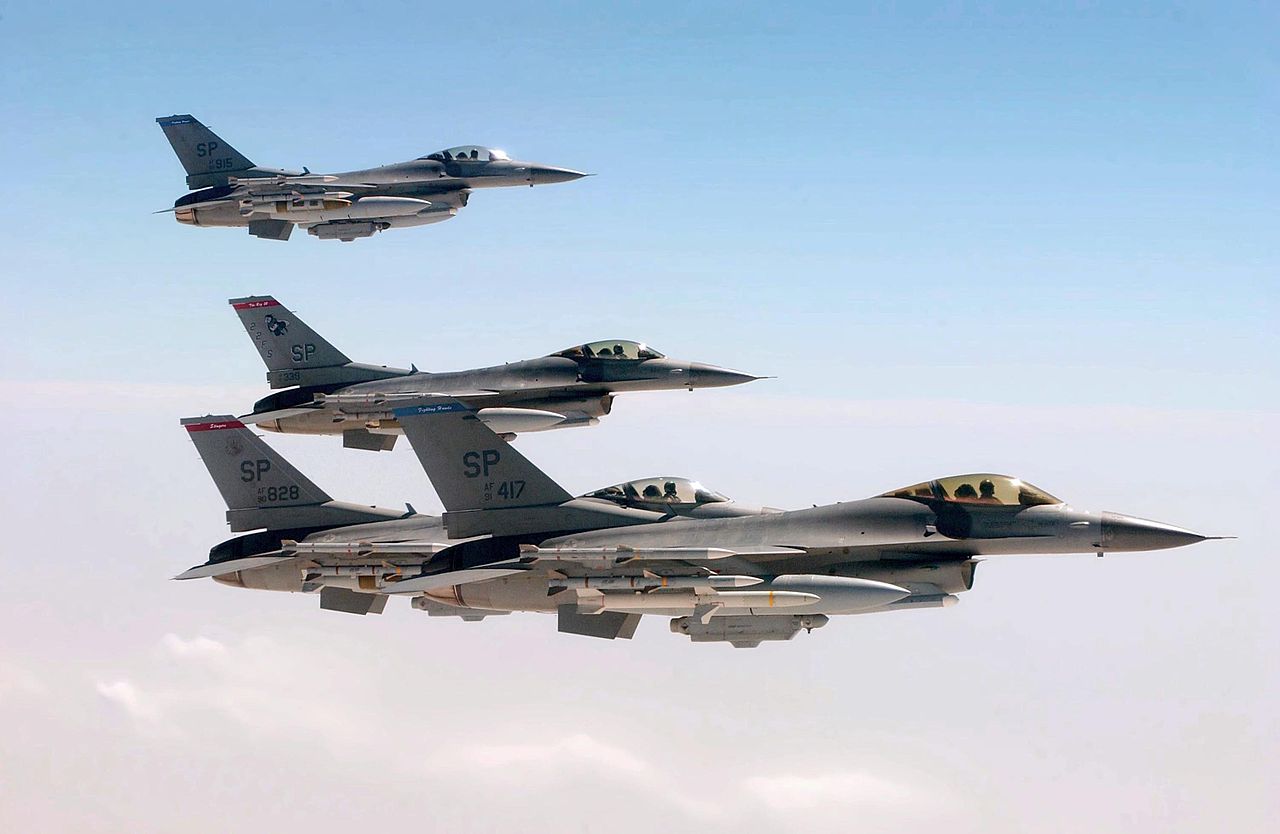
You have to prepare for the worst and in preparing for the worst then you can theoretically handle anything less than the worst, right? So who are out potential enemies in the future? I would say we always have to look to the east, we always have to assume it’s going to be Russia in some form or another. Or a surrogate of Russia that they have created and one of our surrogates gets into it and that’s, again, how a Vietnam starts.
The F-16 production line remains open, and Lockheed has announced they will be moving it to South Carolina—a process which will start by the end of this year. There’s a real opportunity for the United States Air Force to purchase brand new, highly advanced F-16s like the Block 60—I think now the Block 70 is what they call it for the Indian tender, or the F-16V for other buyers. Would it be a smart strategy to buy these jets alongside a reduced F-35 buy, sort of as part of a high-low capability mix like what we saw during the Cold War?
No, I think that’s an excellent idea. I think you need a wing in the Pacific, you need a wing in Europe and then the rest of them stay within the United States, F-35s, and you cut the buy by what? Maybe 50%, maybe 60% of the original number.
And you use the money saved then to invest in tried and true technology that works against everything short of the best that Russia can throw at us and that’s for the F-35 and the F-22. And use the Block 50, 60 and even the Block 70 F-16 for the foreseeable future. I mean that airplane is so adaptable and it’s proven the concept—the modular concept—and the ease of upgrade. Everything that they intended it to do it can do. So there’s no reason to suppose that it can’t continue doing that in the future.
I would caveat that by saying I remember in 1991 going to war and seeing half a dozen different types of fighters out on the ramp. That’s too much, okay. A mix, as you put it, of two different types, that’s not so far fetched at all. Maybe three, okay. It’s very doable and it makes sense fiscally.
You took the Viper to war in Iraq in 2003, and in doing so you were highly decorated for your acts. Your efforts over there were detailed brilliantly in your book Viper Pilot. What are your thoughts on Iraq today and the ongoing fight against ISIS in Mosul? What do you think will happen once ISIS is no longer a common enemy among the different groups that make up the country—including Shiite, Sunni and Kurdish factions—not to mention the external actors that are actively wielding influence over the country?
If and when that happens, and I’d like to caveat my answer by saying that this could have been solved five to seven years ago, maybe even longer, if it had been handled right. But the fact is that we’re left with one messy sandwich right now. To answer your question, I think that they’ll fight each other. They generally always have and they probably always will. If I was a Kurdish leader I would think to myself there is no better time to establish an independent Kurdistan than now. And they may do just that.
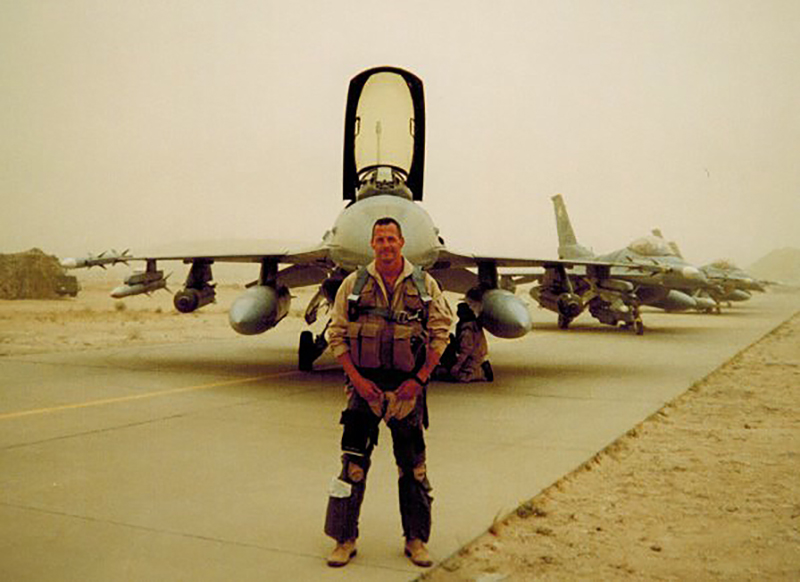
As far as what’s left in Iraq, I don’t know if I said this last time we talked, but I did an essay for an agency of our government about alternatives for Iraq. And even five or six years ago I said what Iraq needs is a king. The so-called experiment with democracy was never really going to work in the Bush-Brenner fiasco right after the second Gulf War ended. They don’t have experience with democracy, they don’t understand it, and to be honest, the forcible implementation of a democracy in Iraq for the last decade or so has left a really, really, really bad taste in their mouth.
I’m sure people can understand that given what’s going on over there. They associate all their current problems pretty much with democracy and the fact that they don’t have a strong leader. They don’t respond to a president, they don’t respond to voting, they don’t really have a moderately educated electorate which is sort of a necessity for a democracy. What they need is a king.
I think what I said in the essay was there is a crown prince. The crown prince of the Hashemite Iraqi Royal Family. He lives in Jordan. I don’t know why he’d volunteer to go in and do this. I wouldn’t if I were him. A very smart guy. I think he went to Johns Hopkins University here in the United States and he’s got a Ph.D. from Cambridge. He married an American. He could certainly do it. I think he’s permanently attached to the UN still.
But that’s what they need, whether it’s him or somebody else, they need a legitimate, strong, central figure to hold Iraq together. It was never really it’s own country anyway. If you don’t want to split it up into different pieces you’ve got to have some sort of strong central figure and I think a king with a constitutional monarchy is the best choice.
And our ISIS strategy in Mosul, obviously this is an outgrowth of Obama’s strategy that sort of gestated. What are your thoughts on it?
You know it’s so convoluted and messy now compared to what it could have been. I’m not going to say it would have been easy to solve a decade ago, but it would have been easier than now. Now there is no alternative but to go in and just clean out the snake pit and I think the best way to do that would be through indigenous folks there on the ground who have a vested personal interest in getting rid of these clowns. And in my mind, the Kurds are still the best option.
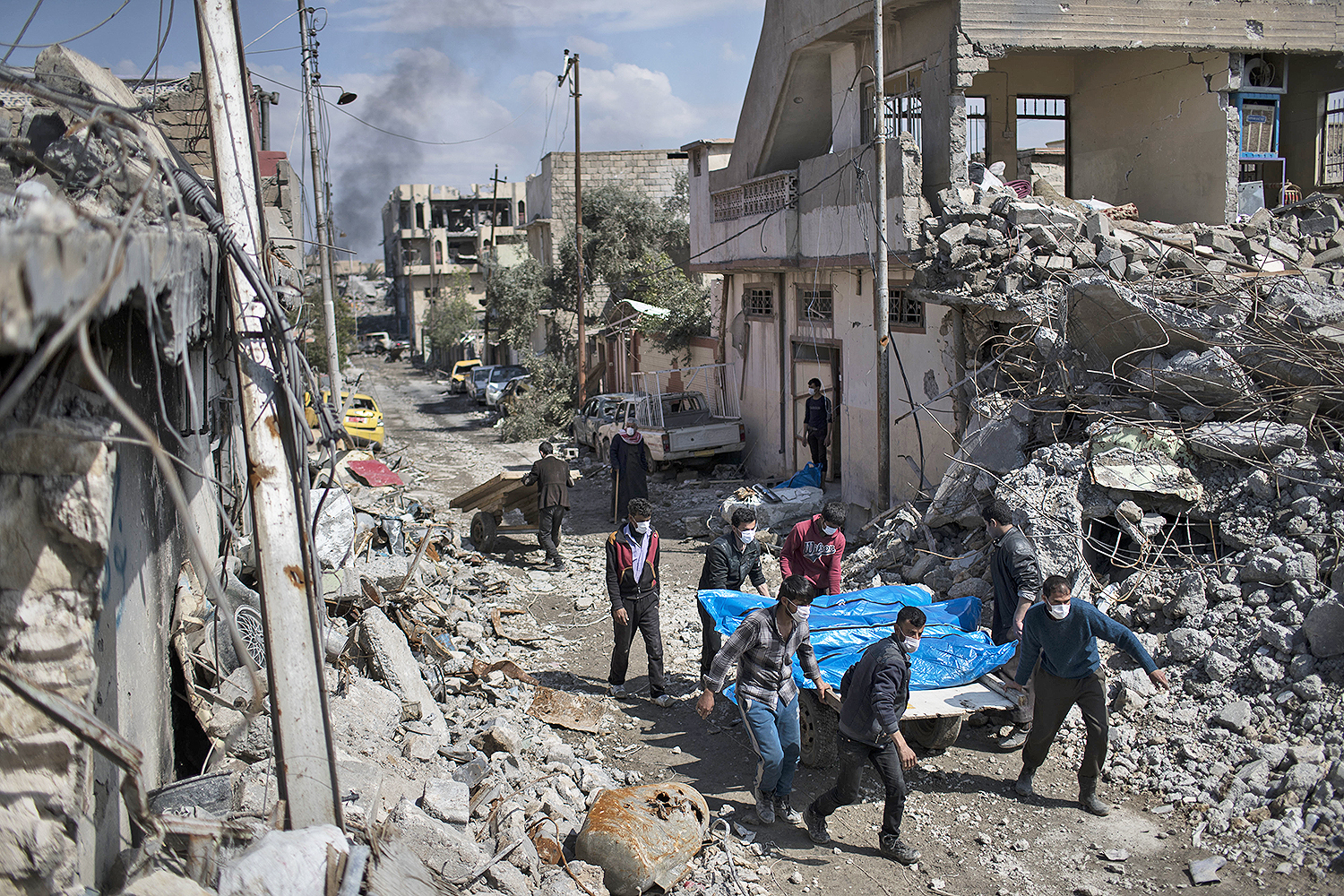
I spent some time in Kurdistan. I know a little bit about the Kurdish people. I have some friends there. They’re great fighters. They would be dependable if they thought they could trust us and I don’t blame them for doubting. But I would have used them to rid their own backyard so to speak of ISIS and just basically given them free reign to do what they needed to do.
If Trump had some advisors that had some experience, or maybe he does and he’s not listening to them, I think he should have started with ISIS rather than tackling some of these more contentious issues. If he would have started with something that everybody can agree on, it’s going to do him nothing but good. But he didn’t do that.
Well that’s a good jumping off point for us to head to Syria. What are your thoughts on America’s strategy in Syria, and especially on the Trump administration’s recent Tomahawk strike on Assad’s airfield in response to the chemical weapon attack in Idlib province?
I think Tomahawk missiles have limited utility. They’re okay for what he’s using them for. Remember Clinton did the same thing. It’s a way to look like you’re actually doing something without really doing a whole lot or risking a lot. And sometimes, in some places that’s okay. I wouldn’t send one American into say the Sudan or Somalia, I’d wail away on them with cruise missiles all day long, but the situation is a lot less complicated then it is in central Syria.
I follow it fairly well and even I’m confused now about who’s good, who’s bad, and who’s on who’s side. It’s such a mess. I don’t really have an answer except to say that if this had been handled differently during the previous administration, we probably wouldn’t be facing the mess we are now.
Russia already has S-300 and S-400 batteries installed in western Syria, as well as Pantsir S-1 point air defense systems, and now Moscow is saying they’re going to go and protect Assad’s air space with those assets. Before the cruise missile strike, those systems were supposedly there to solely protect Russia’s own airfield and port facility in the country. Then on top of that, because of these strikes, Russia says they are going to now rearm Assad with better surface-to-air missile systems and basically give him an integrated defense system for what sounds like free of charge. You’re one of the most renowned Wild Weasels of all time. How hard would it be in the future for the US to go back in and actually try to neuter Assad’s military capability with those advanced assets now pointing at our aircraft?
Couple of things. It sounds an awful lot like North Vietnam in 1964 doesn’t it? The Russians did almost the same thing with the SA-2 that they’re doing now. And you notice from the Tomahawk strikes, how well did their vaunted air defense system work?
Either they purposely didn’t use it because they didn’t want to give any of their weaknesses and strengths away, which we already know anyhow. Or it’s really not as good as they make it out to be, or some combination of the two. I kind of tend towards the latter explanation. These things are never as good as their touted to be. It doesn’t mean you underestimate them, but it means you take that for what it’s worth and you analyze what you know. We’ve already done that.
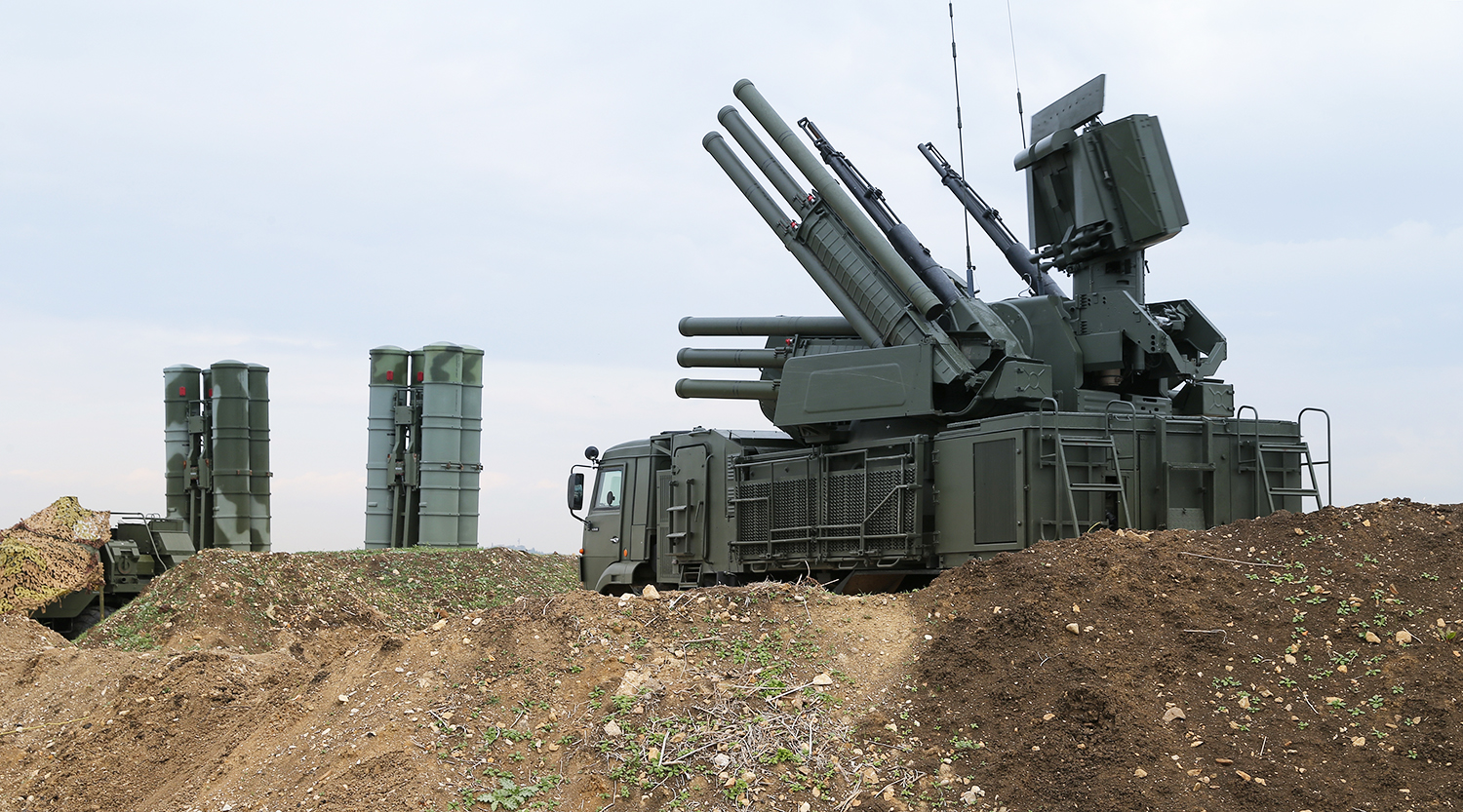
There are ways in and around those systems and I will go back to one of my life-long premises—anything that kills a SAM or part of a SAM can be a Wild Weasel. So it doesn’t necessarily mean it’s me in a tactical airframe. It might be special forces teams on the ground blowing up radars. It might be naval warships standing offshore if they’re within range of their guns and just blasting the hell out of them.
It could even be, and this is my favorite use for a drone, a suicide drone. A drone that’s been armed and sent in to do one thing and that’s dive into something and explode. I love to use drones for things like that.
Drones are useful. I love the idea of sending drones in to stir up an IADS (Integrated Air Defense System). Then you locate the radars, you locate the guns and then you send in the real aircraft to destroy them because drones aren’t going to survive very long in an environment like that.
I would say this, the short answer without getting into the technical end of killing those systems, is this: Russia has tried this before and it’s never worked well for them. I think Putin’s a chess player like most Russians are and I think he’s playing chess and to some degree he’s bluffing on the lack of an American plan and America’s national will to get involved with Syria. I could go round and round on that too. But the fact is, Russia is trying to resurrect themselves, as you very well know, as a new world power, and saying ‘hey we’re back in the game.’
They never got over the fact that their world collapsed in the early ’90s and this is Putin’s way of keeping himself in power. He has too. He’s running out of cash. His GDP is down and inflation is up. I think what, a quarter of the Russian banks fell out of the market in 2015. It is not a strong economy, it’s never been a strong economy. They could send guys into outer space but they can’t get crops in from the fields to the markets before they rot, okay.
Russia is what, 68% dependent on petroleum? We’re eight. There’s a lot of ways to cripple them and they know it. So I think a lot of this is a poker game and it could have been solved with some competent diplomacy five or eight years ago, but it wasn’t.
You spent a lot of time in Egypt, as detailed that in your memoir, training Egyptian Air Force pilots on how to fly the F-16. The Obama administration turned away from the el-Sisi government because it seized power from the Muslim Brotherhood undemocratically through a coup. In our absence, Russia stepped in, they’ve deepened their ties to the Egyptian government and they’ve sold them advanced MIG-29s and other aircraft and weapon systems. The French have too with the Rafael. These likely would have been F-16 orders if the US had stayed engaged. Now the Trump Administration is turning back towards the el-Sisi government and treating Cairo like a close ally once again. So from the guy that was there for years and has the military connections, what are your thoughts about the changing relationship between the U.S. and Egypt? How do you close the military ties with Egypt impact our interests in the region?
Well, I think the failure of the previous administration to keep those ties strong is another glaring example of their amateurism, incompetence and hypocrisy too. I mean you’re willing to support regime X in Libya or half a dozen in Sub-Saharan Africa that have no concept of democracy, and yet you’re going to use that (coming to power via a coup) as an excuse for backing away from Egypt. I mean, give me a break.
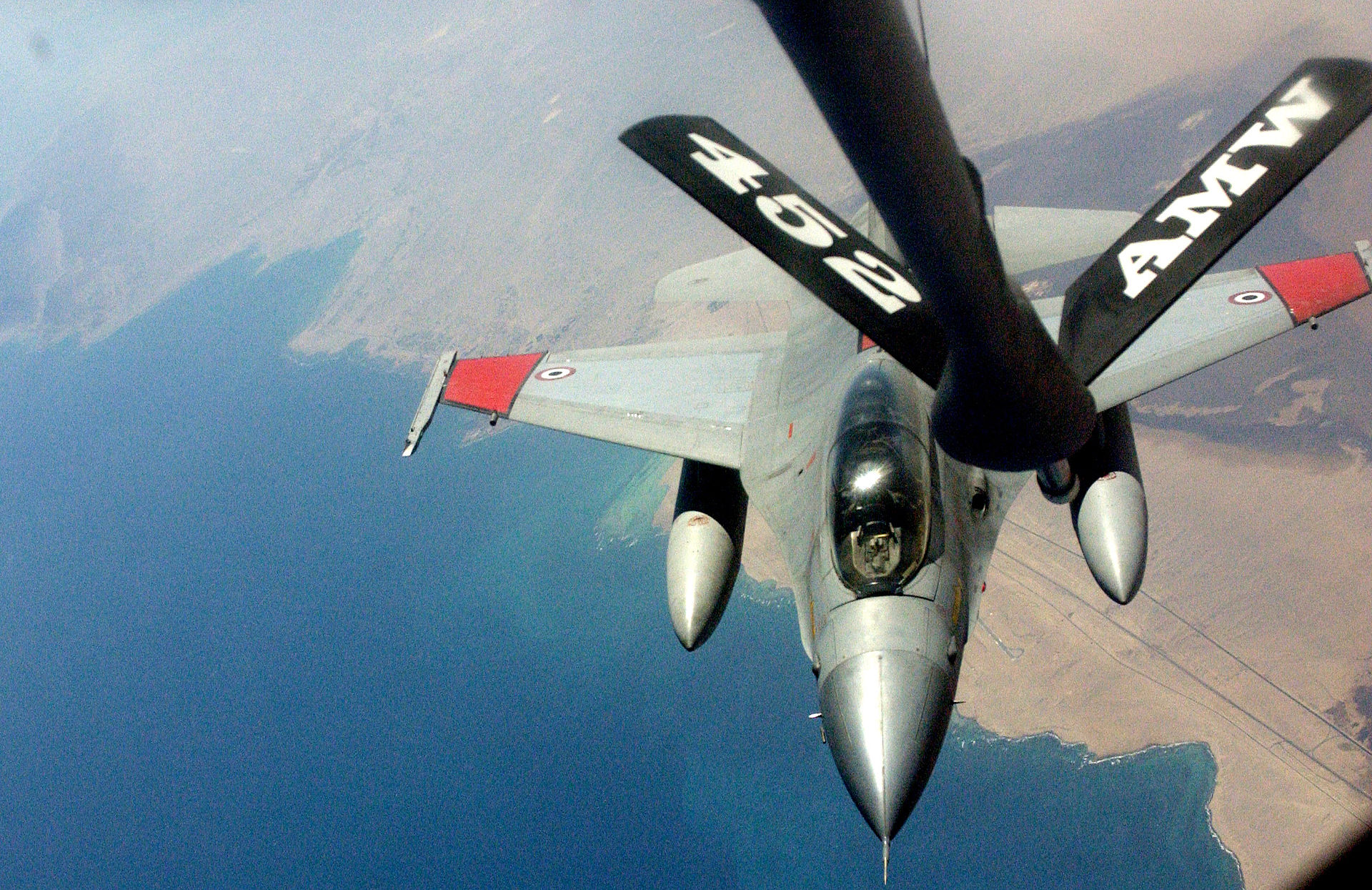
Egypt is obviously in a prime strategic place. The Suez Canal isn’t as important really as it use to be, but it’s still vital to the region. And more importantly, as part of Africa, Egypt can do a lot as far as stability goes especially with its neighbor. It’s close to Libya, it has an interest in seeing Libya stabilized. Egypt could do a lot. So I think it’s well worth having them as an ally and if that means continuing to strength them, then so be it.
I mean face it, when one pulls out there’s a vacuum. And when we pulled out the Russians tried to move in as they try to move in everywhere, which is one reason why I’m going to go against the grain here to say that some sort of better accommodation with the Syrian regime probably would have been a better idea because it was a foregone conclusion that if we pulled out of there and threw up our hands and said we’re done, the Russians would move in. You’ve got to expect that. They tried it in Egypt.
So I think that the Egyptian regime, as long as it’s playing somewhat by the rules—and nobody’s hands are clean over there—it’s a matter of pragmatism. Okay. As long as they’re somewhat playing by the rules, the rules we make because we’re helping them, then they’re worth supplying, they’re worth training, they’re worth keeping on our side. Better have them with us then against us, right?
Again, I’m going to go against the grain here to say that the same thing about Iran. Iran has been a pariah basically since the late ’70s. Well, it’s been time for some time to just put that aside. The bottom line is as bad as the embassy seizure was, they didn’t kill anybody. Okay, I mean, everybody came back. They could have just as easily drug them out in the street and executed them all, but they didn’t do that.
I think some 70% of the population in Iran is under age 35. They don’t remember the Shah, they don’t remember the revolution. They’re tired of not having cell phones and computers and being told they can’t dance and hold hands with girls and all the things that they want to do. I think Iran would be a tremendous ally to the United States if it was handled right. Everybody’s goobered up over the nuclear issue.

Well, they’re going to get it one way or another. If they got it from us at least we would know what they have, right? And if they got it from us along with some reasonable terms and conditions, then again it’s better to have them with us then against us. And if they don’t get it from us, they’re going to get it from the Chinese or the Russians and that’s bad for everyone.
Iranians, they’re not Arabs, you know that but a lot of people don’t… They would go a long way towards stabilizing that end of the region too. So there’s a lot of things that could be done if we had competent people kind of leading the charge from Washington which we haven’t had and my vote’s still out on whether or not we have it now or not. They seem more interested in squabbling amongst themselves then they do in actually leading.
Now most importantly, we want to know what you’re up to. Viper Pilot and Lords Of The Sky were really big hits. I read them and I know a lot of other people that did too. What new projects are on the horizon? What can you share with us?
Well, The Hunter Killers came out, what, in 2015? That did really, really well and I had already moved on to writing The Flight which is about Charles Lindbergh’s trip across the Atlantic. It is due out in a month. May 16th is when I think it goes on sale. And I’m under contract to write another book about test pilots which I have to deliver sometime in 2018. Then, what else happened? Let’s see, I did a Breitling commercial. They got six pilots from around the world. They called me and asked me if I wanted to do it and I said have you really looked at my face, are you sure? And they kind of chuckled and said yeah. It was a lot of fun. It’s in most of the airline magazines now and online.

Then I went out to the South Pacific in December on behalf of a major network, can’t say who yet, to find out what happened to Amelia Earhart. So look for that in probably June. It’ll come out through, like I said, through a major cable network.
Tell us a little bit about your other company, what are your objectives with it?
Oh, the private military stuff. Well, we’re involved in West Africa. There’s some counter-piracy and other issues over there that they like to use us for. And water is becoming a big deal in West Africa. Oil always has been. We’ve got some options on the table for helping some of those companies stay protected and stay safe so they can deliver what they need to. Not a place I’d go on vacation, but it’s good for business.

Contact the editor: Tyler@thedrive.com
